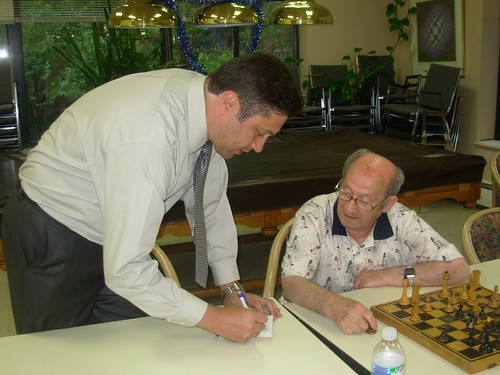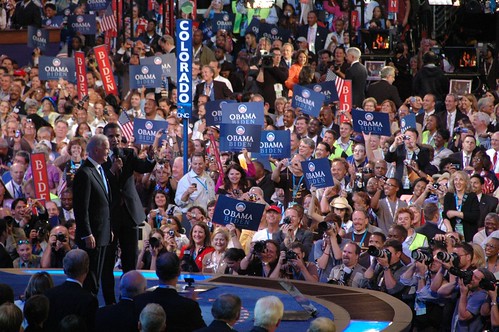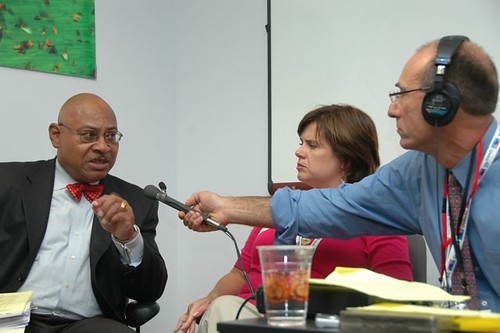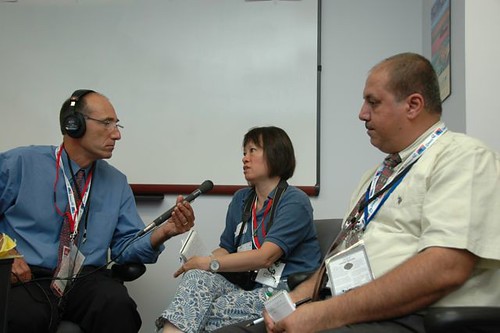Last week, as many of the nation’s Latino Democratic operatives and immigrant rights activists expressed high hopes in Denver for the future of comprehensive immigration reform, the reality of the nation’s current immigration policy was vividly displayed in tiny Laurelton, Mississippi.
Nearly 600 workers were swept up by federal Immigration and Customs Enforcement agents in a worksite raid at Howard Industries, an electrical parts manufacturer. The sweep in Laurel, population 18,000, made it the largest immigration raid in US history, eclipsing the raid earlier this summer in Postville, IA (click here to listen to this recent NPR radio update from Postville), which continues to be in the news.
The very day that federal immigration authorities arrested undocumented workers at Howard industries, the Obama campaign removed every mention of immigration reform from a convention speech by Bronx Rep. José Serrano, one of Congress’ most persistent advocates of comprehensive immigration reform.
Despite the high hopes of immigrant rights advocates and legislators that the next president will finally take on and win reforms to federal immigration laws, both McCain and Obama have been all but silent on the issue as the election approaches.
As recently as last year, both candidates supported legislative proposals that would have granted legal status to many of the nation’s roughly 12 million undocumented immigrants–but both start their policy statements today with the need to get tough on undocumented immigrants first. The candidates have each, at times, supported proposals to strengthen the nation’s southern border fence and to penalize employers who hire undocumented workers. Such law-and-order strategies continue to appear in their platforms today.
On the policy pages of his website, Senator McCain highlights the nation’s notoriously porous southern border and states:
When we have achieved our border security goal, we must enact and implement the other parts of practical, fair and necessary immigration policy.
For his part, Senator Obama’s campaign website outlines his support for
a system that allows undocumented immigrants who are in good standing to pay a fine, learn English, not violate the law, and go to the back of the line for the opportunity to become citizens.
Despite much-discussed efforts to mobilize Latino voters, Feet in 2 Worlds reporters covering the convention in Denver found few Democratic operatives willing to broach the subject of immigration policy, and then only in conversations far from the convention’s main stage, and usually in the context of encouraging Latino voters to support Senator Obama’s candidacy.
In fact, a form of détente has emerged: both presidential campaigns appear to have decided to broach the immigration subject only in smaller discussions with tailored audiences, such as Latino civil rights activists (at the annual conferences of the National Council of La Raza and the League of United Latin American Citizens), or wealthy Silicon Valley campaign donors.
A FOX News producer detailed a fractious debate within the Republican Party as it tried to finalize its final immigration policy platform last week before its own convention. She wrote that some delegates wanted platform language that rejected all efforts at “comprehensive immigration reform,” because they considered the phrase “a code word for amnesty.”
The recently-released GOP platform devotes a whole one and half pages to immigration policy with a focus on border security, a rejection of “amnesty” and “en masse legalizations,” and a call for English to be the official language of the US. For its part, the Democratic Party platform promises, “tough, practical, and humane immigration reform in the first year of the next administration.” The document also underlines the need to, “require undocumented immigrants who are in good standing to pay a fine, pay taxes, learn English, and go to the back of the line for the opportunity to become citizens.” Notably, both parties start their platforms by stressing the need for expanded border enforcement.
Obama himself made one mention of immigration policy during his acceptance speech at the Democratic National Convention last Thursday, but without any prescriptions for change:
Passions fly on immigration, but I don’t know anyone who benefits when a mother is separated from her infant child or an employer undercuts American wages by hiring illegal workers.
Despite the high hopes, the current face of the issue is rooted in the Bush administration’s enforcement-only approach. In addition to a series of high-profile, large-scale work site immigration raids, the other standout federal program this year was ‘Operation Scheduled Departure.’ The short-lived effort, which sought to encourage undocumented immigrants to deport themselves, was quietly laid to rest at the end of August after a dismal three-week pilot phase. Only eight immigrants volunteered to return to their home countries through the program.
In Postville, IA, immigrant workers were detained, charged and tried in a matter of days. A majority of the 289 workers swept up in Postville’s raid were put into fast-track deportation proceedings and flown back to their home countries within a month of the raid.
Mississippi immigrant rights advocates, including the Mississippi Immigrant Rights Alliance (MIRA), reported signs of immigration agents preparing for a large-scale raid in Laurel over the weekend, establishing roadblocks at Wal-Mart parking lots and renting most of the hotel rooms in the small town. MIRA also reported possible preparations for another raid at the Southern Hens poultry plant in Mossell, MS, where ICE agents were reportedly preparing to put the plant under lockdown.
In the midst of an increased federal focus on apprehending undocumented immigrants, many undocumented immigrants reportedly were reluctant to evacuate from New Orleans and the Gulf Coast, and opted to stay behind and ride out the recent Hurricane Gustav. Despite assurances from the Department of Homeland Security to the contrary, immigrants were worried federal agents would institute immigration documentation checks on the buses provided to evacuate residents, according to the New Orleans Worker’s Center for Racial Justice.
Mississippi legislators recently passed a new state law that makes it a felony for businesses to employ undocumented immigrants. It is part of a new wave of state-based immigration laws dubbed ‘employer sanctions’ and enacted in states with large immigrant populations. These laws have been decried by business owners, immigrant advocates, and workers’ rights activists as impractical, unfair, and likely to drive immigrant workers further into an underground economy.
In a nation that is increasingly black and brown, and in an election year when one of the major party presidential nominees is the child of an African immigrant, there is still no clarity about what the next administration might do to transform federal immigration law.





